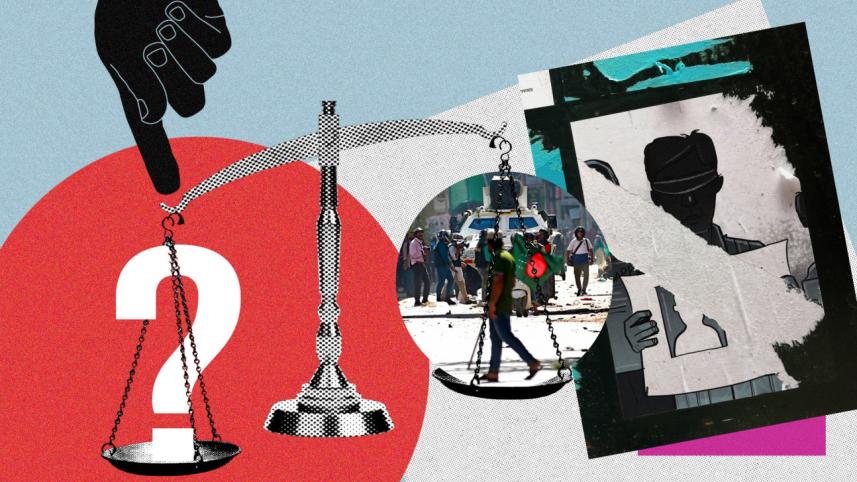How weaponising murder cases is shielding real perpetrators

One year after the July uprising, Bangladesh finds itself at a critical juncture, yet shows little sign of crossing it.
The protests that erupted between July 16 and August 5, 2024, were expected to mark a turning point. While the popular campaign did change a regime, it failed to change the justice system.
According to official government data, nearly a thousand people were killed and thousands more injured during the few weeks of the uprising. Law enforcement agencies, often accompanied by Awami League goons, opened fire on students and civilians. This violence, in the final days of desperation, was not hidden. The armed cadres opened fire on protests in plain sight.
There is a vast body of video and other public evidence of the killings. Local and international media outlets including the BBC, Al Jazeera, Netra News, The Daily Star, and Prothom Alo published multiple investigative reports documenting injuries, identifying shooters, and tracing command structures. Survivors gave testimony, while hospitals and doctors issued medical certificates.
The United Nations, through its Office of the High Commissioner for Human Rights (OHCHR), also reported widespread violations during the July-August 2024 protests, based on hundreds of interviews and digital evidence. The interim government itself released documentaries confirming key incidents.
If ever there was an opportunity to break the cycle of corrupt legal process, this would be it. But that is not how things turned out. By July 2025, 1,730 cases were filed across the country related to the uprising. Among these, 731 are murder cases. But charge sheets have been submitted in only 26 of them -- just 8 involving murder -- leaving the overwhelming majority in limbo. Many first information reports (FIRs) named hundreds of people at once. A few individuals, allegedly murdered, were later found alive. People were charged with murder when death was out of natural causes. It was clear that the old practice had not changed really.
One example came on August 24, when content creator Touhid Afridi was arrested in Barishal for a murder during the uprising in Dhaka's Jatrabari. His name was 11th on the list of accused, alongside Sheikh Hasina, Obaidul Quader, and former IGP Abdullah Al Mamun. The case mentions over 2,000 unidentified individuals. His father, MyTV chairman Nasir Uddin Sathi, had also been arrested a week earlier in the case. Afridi was remanded for five days.
Just days earlier, on August 15, rickshaw-puller Azizur Rahman was beaten at Dhanmondi 32 for carrying flowers to Bangabandhu Sheikh Mujibur Rahman's memorial. "I don't do politics. I just love Bangabandhu," he said before being jailed. His charge? Attempted murder during a clash on August 4, 2024 at New Market, an incident he had no connection with. He was released on bail the next day. Police later said he was detained in a different case.
In today's Bangladesh, symbolic acts are sometimes treated as threats. Meanwhile, those responsible for violence remain untouched.
Consider the case of Somes Uddin, who died of a heart attack while fleeing the police. His death was turned into a politically motivated murder case. Among the accused was Mahmudul Haque, an assistant professor at Begum Rokeya University. He was jailed for over a week before protests from colleagues and other stakeholders. Eventually, he secured bail.
In Narayanganj, the father of a slain protester filed a case naming 180 people, including Supreme Court lawyer and rights activist ZI Khan Panna. He later admitted he had never met Panna and signed an appeal to drop the charge.
In Bogura, a man claimed his 11-year-old son had been killed during the protests. He filed a case against 118 people. Weeks later, the boy was found alive, playing cricket. The father confessed he had been promised Tk 30 lakh and land to lodge the complaint.
In Jatrabari, a case filed after August 5 -- naming nearly 200 Awami League leaders, including Sheikh Hasina -- in the killing of Obaidul Haque. The complainant, one "Md Ali," disappeared. Investigators could not verify his identity. Obaidul's widow denounced the case as false.
Even figures far removed from street politics have been implicated. On July 24, former chief justice ABM Khairul Haque, now 80, was arrested and named in a murder case. His lawyers noted he was under police protection at the time. Bail was denied.
Journalists have also been targeted. On August 21, 2024, journalists Farzana Rupa and Shakil Ahmed were detained at Hazrat Shahjalal International Airport. They were placed on repeated remands in connection with a garment worker's death. Press freedom groups condemned the charges as baseless. The couple remains entangled in legal proceedings.
This pattern is clear -- detain suspect, accuse them of murder, investigate later. Bail is rarely granted. Even when secured, individuals are "shown arrested" in new cases before leaving jail. Custody becomes punishment.
If anyone has committed crimes, the law must take its course. But framing individuals based on political identity undermines justice and disrespects the families of victims.
Bangladesh has long used the justice system against political rivals. What's new is that this is happening even when perpetrators are clearly identified -- caught on camera, named by survivors. By flooding the courts with dubious cases, the guilty gain cover -- everything looks political. As political priorities shift, real perpetrators slip further away.
The interim government had promised accountability. Chief Adviser Muhammad Yunus was himself sentenced in a case that was largely considered politically motivated, while Adviser Adilur Rahman Khan had been jailed for documenting extrajudicial killings. Many hoped their experiences would lead to reform.
If the government is serious about justice, it must now act decisively: separate fabricated cases from genuine ones, ensure transparent investigations under independent oversight, protect victims' families and witnesses from intimidation, and prosecute those clearly identified in evidence.
Otherwise, the July uprising will not only remain the most documented episode of state violence in Bangladesh's history, it will also stand as proof that even overwhelming evidence cannot deliver justice when a government allows politics to prevail over law.




 For all latest news, follow The Daily Star's Google News channel.
For all latest news, follow The Daily Star's Google News channel.
Comments